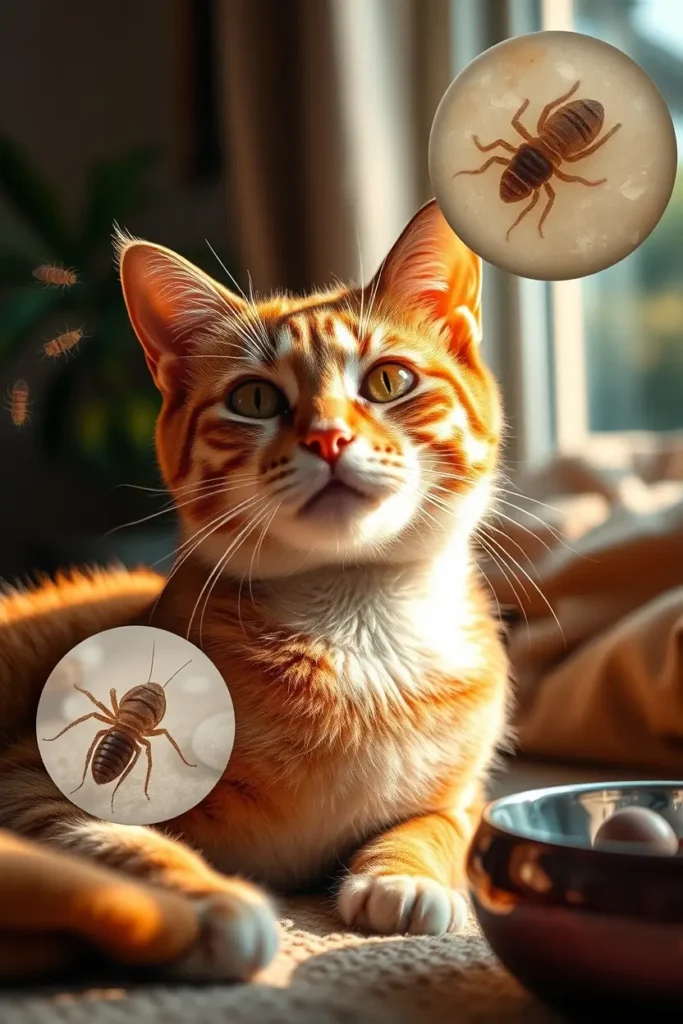At Whizpet, we take pet health seriously and have conducted extensive research to help cat owners understand how do indoor cats get worms. Many believe that keeping a cat indoors eliminates the risk of parasites, but our findings prove otherwise. Worms in indoor cats can still occur due to fleas, contaminated food, or even human-borne parasites. Our team at Whizpet has analyzed numerous cases, consulted veterinary experts, and reviewed scientific studies to uncover the hidden risks that even the cleanest homes can harbor.
Our goal with this blog is to provide valuable insights into the causes, symptoms, and best prevention strategies to protect your feline companions. Through expert-backed research, we emphasize that early detection and proactive care are crucial in preventing worms in indoor cats from becoming a serious health concern. With practical advice, real-life examples, and scientific evidence, we ensure that cat owners have the knowledge they need to safeguard their pets. Read on to learn how to protect your cat from these pesky parasites and maintain their overall well-being.
How Do Indoor Cats Get Worms?
1. Fleas and Parasites
One of the most common ways indoor cats get worms is through fleas. Fleas carry tapeworm larvae, and when a cat grooms itself and ingests an infected flea, the worm matures inside the cat’s intestines.
2. Contaminated Litter Boxes
A litter box can become a breeding ground for parasites. If an infected cat defecates in the litter box, the eggs of worms like roundworms or hookworms can spread to other cats in the household.
3. Infected Prey and Raw Food
Indoor cats that have access to raw food diets or accidentally catch rodents or insects can get infected with worms. Many small animals carry parasite larvae that can transfer to your cat upon ingestion.
4. Human Contamination
Humans can unknowingly bring in worm eggs through their shoes, clothes, or hands. If an owner has been in an area contaminated with worm eggs, their cat may contract worms by coming into contact with them.
5. Mother-to-Kitten Transmission
If a cat was not properly dewormed before pregnancy, she could pass worms to her kittens through the placenta or while nursing. Even if your cat stays indoors, this remains a possibility if she was not properly treated before giving birth.

Symptoms of Worms in Indoor Cats
It is essential to recognize the signs of worms in indoor cats early. Here are some common symptoms:
- Vomiting (may contain worms)
- Diarrhea or soft stools
- Weight loss despite a healthy appetite
- Bloated stomach
- Lethargy and weakness
- Worms visible in stool or around the anus.
- Excessive licking of the rear end
- Dull coat and poor grooming habits
Can Cats Get Worms from Litter Boxes?
Yes, a litter box can be a source of worm infestation. If an infected cat defecates in the box, worm eggs can contaminate the litter and spread to other cats. Worms in indoor cats are commonly transmitted through contact with infected feces, making a dirty litter box a significant risk factor. Some of the most common worms in indoor cats include roundworms, tapeworms, and hookworms. These parasites can lead to digestive issues, weight loss, and overall poor health. Regular cleaning and proper disposal of waste can significantly reduce this risk. Using high-quality litter and disinfecting the box frequently can further help prevent worms in indoor cats.
Can Humans Get Worms from Cats?
Yes,Certain worms, like roundworms and hookworms, can be passed from cats to humans.This usually happens through accidental ingestion of eggs from contaminated surfaces, such as litter boxes, carpets, or even bedding. Children and individuals with weakened immune systems are more vulnerable to these infections. Since worms in indoor cats can still pose a risk to humans, maintaining a clean living environment is crucial. Regular deworming, proper litter box maintenance, and frequent handwashing can help prevent transmission. Ensuring that your pet receives routine veterinary care can also reduce the chances of worms in indoor cats spreading to humans.
How to Get Rid of Worms in Indoor Cats Naturally
If you prefer a natural approach to deworming, consider the following remedies:
- Pumpkin Seeds: These contain cucurbitacin, which can help eliminate worms.
- Diatomaceous Earth: A small amount of food-grade diatomaceous earth in your cat’s food can help kill parasites.
- Probiotics and Fiber-Rich Foods: A balanced diet with probiotics and fiber can help improve digestion and eliminate parasites naturally.
- Coconut Oil: Some studies suggest coconut oil may have mild deworming effects.
How to Treat Worms in Cats
If you suspect your indoor cat has worms, it is essential to seek veterinary treatment. Some common treatments include:
Deworming Medications: Available in oral or topical forms, these medications effectively eliminate worms. Your vet can recommend the best option based on the type of parasite present.
Flea Prevention: Since fleas can transmit worms, using flea preventatives is crucial. Keeping your home flea-free helps reduce the risk of worms in indoor cats.
Regular Vet Check-Ups: Routine veterinary visits help detect and prevent worm infestations early. Early detection ensures effective treatment and protects other pets. Maintaining a clean litter box and providing a healthy diet can further reduce the chances of worms in indoor cats.
How Often Do Indoor Cats Get Worms?
The frequency of worm infestations in indoor cats depends on various factors, including exposure to fleas, diet, and hygiene practices. Even though indoor cats have a lower risk than outdoor cats, they can still get infected through contaminated litter boxes, fleas, or even rodents. Regular deworming is essential to prevent health issues caused by worms in indoor cats. Veterinarians typically recommend deworming every three to six months, depending on your cat’s lifestyle and risk factors. Keeping your home clean, using flea prevention, and maintaining proper litter box hygiene can further reduce the chances of worms in indoor cats, ensuring your pet stays healthy.

Can I Get Worms from My Cat Sleeping in My Bed?
While the risk is low, it is possible to contract certain parasites if your cat has worms. Roundworms and hookworms are the most common types that can spread to humans through accidental ingestion of microscopic eggs. If your cat sleeps in your bed, there is a chance that contaminated fur or bedding could expose you to these parasites. Regular deworming, washing your cat’s bedding, and maintaining good hygiene can help reduce the risk. Since worms in indoor cats can still pose health concerns, keeping their litter box clean and ensuring flea prevention is essential. Proper care minimizes the risk of worms in indoor cats affecting humans.
Best Prevention Tips to Keep Indoor Cats Worm-Free
To ensure your indoor cat stays worm-free, follow these best practices:
- Regular Deworming: Administer deworming treatments as per veterinary recommendations.
- Flea Control: Use flea preventatives to stop tapeworm transmission.
- Clean Litter Boxes Daily: Prevent worm eggs from accumulating.
- Wash Hands Frequently: Especially after cleaning the litter box or handling your cat.
- Provide a Healthy Diet: A well-balanced diet boosts immunity and digestion, reducing the risk of parasites.
- Routine Vet Visits: Regular check-ups help detect and treat worms before they become severe.
FAQs About Worms in Indoor Cats
1. How do indoor cats get worms from fleas?
Indoor cats can get worms if they ingest an infected flea while grooming. Fleas often carry tapeworm larvae, which develop into adult worms in a cat’s intestines.
2. Can cats get worms indoors even without exposure to other animals?
Yes, indoor cats can still contract worms through contaminated food, flea infestations, litter boxes, or eggs brought in by humans.
3. How do you get rid of worms in indoor cats effectively?
The best way to eliminate worms in indoor cats is through deworming medications prescribed by a vet, along with maintaining proper hygiene and flea prevention.
4. Why do indoor cats get worms even if they never go outside?
Indoor cats can get worms through indirect exposure, such as contaminated litter boxes, infected food, or fleas brought inside by humans or other pets.
5. Can humans get worms from their indoor cats?
Yes, humans can get worms from cats, mainly through accidental ingestion of worm eggs from contaminated surfaces. Proper hygiene and regular deworming can help prevent transmission.
Conclusion: Protecting Your Indoor Cat from Worms
Worms in indoor cats are a common issue, but they can be prevented with the right approach. Regular deworming, flea prevention, and proper hygiene are key to keeping your cat safe. If you suspect your cat has worms, consult a veterinarian for the best course of action.
Take action today! Schedule a vet visit and keep your indoor cat happy, healthy, and worm-free.
Related blog: For more detailed information about pet care

